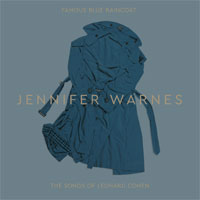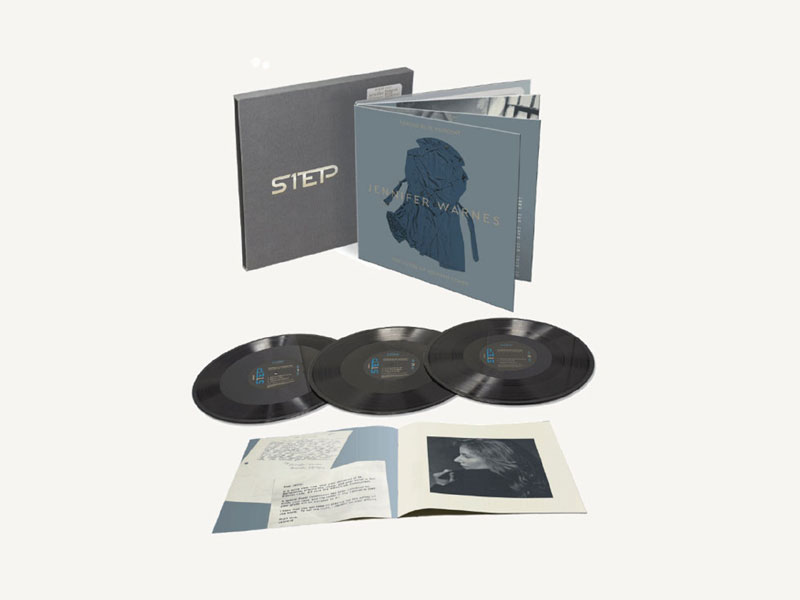Jennifer Warnes • Famous Blue Raincoat: The Songs of Leonard Cohen Cypress Records/Impex Records IMP6033-1  thought of
Jennifer Warnes recently while reading the newly released biography of Ella Fitzgerald (Becoming
Ella Fitzgerald). Born thirty years apart -- Fitzgerald in 1917 and Warnes in 1947 --
the two artists neither looked nor sounded anything alike. However, they faced a frequent
problem. Early on, and for much of her career, Ella Fitzgerald had to work ten times as
hard as any man to earn respect for her art, because many thought a female singer to be
window dressing. She was simply too “pop” for the serious business of jazz. When
Warnes released Famous Blue Raincoat (FBR), she was likewise written
off. She received positive reviews, but some critics found the record overproduced and
complained that her covers of Leonard Cohen songs did not sound like Cohen. When the great
sound turned the album into a hi-fi-show favorite, she was criticized for being a mere
female vocalist for audiophiles, suggesting a lack of artistic merit. thought of
Jennifer Warnes recently while reading the newly released biography of Ella Fitzgerald (Becoming
Ella Fitzgerald). Born thirty years apart -- Fitzgerald in 1917 and Warnes in 1947 --
the two artists neither looked nor sounded anything alike. However, they faced a frequent
problem. Early on, and for much of her career, Ella Fitzgerald had to work ten times as
hard as any man to earn respect for her art, because many thought a female singer to be
window dressing. She was simply too “pop” for the serious business of jazz. When
Warnes released Famous Blue Raincoat (FBR), she was likewise written
off. She received positive reviews, but some critics found the record overproduced and
complained that her covers of Leonard Cohen songs did not sound like Cohen. When the great
sound turned the album into a hi-fi-show favorite, she was criticized for being a mere
female vocalist for audiophiles, suggesting a lack of artistic merit.
Jennifer Warnes started her career as a frequent guest singer on The Smothers Brothers Comedy Hour, beginning in 1967. She then worked as a backup singer for Leonard Cohen and other artists, recorded a couple of well-received songs for film scores, and sang backup for several other singers. She released a few albums but did not break into the big time until the release of this album in 1987. For those who have never been exposed, Famous Blue Raincoat is an album of (mostly) Leonard Cohen songs, and Cohen joins in on one (“Joan of Arc”). It was released on Cypress Records after Arista and MCA rejected the concept for the album. Even the most casual fan of Leonard Cohen will recognize most of the songs. Two of the best-known, “First We Take Manhattan” and “Ain’t No Cure For Love,” first appeared on FBR, and then shortly after on Cohen’s album I’m Your Man. The backing musicians, including Stevie Ray Vaughan, David Lindley, Van Dyke Parks, and Robben Ford, provide a cohesive sound that to these ears never seemed overproduced or like window dressing. The original LP became an audiophile favorite, and it was such a staple at audio shows that it became hard for some to listen to it ever again. I am not among that number; it retains its freshness today, even after countless replays. FBR’s first audiophile incarnation came in 2007 when Cisco Records put out a three-LP 45rpm set [Cypress Records/Cisco Records CLP7060-45]. In 2015, Impex released a 33rpm version [Cypress Records/Impex Records IMP6021], then released a repressing on blue vinyl in 2020. This latest version makes every effort to impress -- a One Step 45rpm version using the VR-900 Supreme vinyl formulation. It is said to be the very last version from the original master tapes. FBR was a digital recording, but this set used the first-generation mix-down tapes. According to Impex, once this release, limited to 7500 numbered copies, is completed, those original mix-down tapes go into the vault forever. In addition, this boxed set includes the four outtakes included in the 20th Anniversary CD issued by Impex in 2007 [Cypress Records/Impex Records IMP8301].
You have not heard Famous Blue Raincoat until you have heard this version. Whether it is the One Step process, the 45rpm speed or the special vinyl formulation, or a combination thereof, this set had me stopping and re-appreciating songs that I have heard countless times but now sounded fresh and new. The attack of the percussion is more dynamic, the layers of the soundstage more obvious and fuller, and details that I previously thought could not be improved upon now revealed newfound musical information. My first listen made me think of reviewers who have said a film was unlikely to look better than on Blu-ray, only to find, years later, that the Blu-ray was eclipsed visually by a new 4K Ultra HD disc. This new One-Step pressing easily eclipses all versions that preceded it. I replayed the original Impex release, side by side, with this One Step and the differences are quite dramatic. Smitty Smith’s synthesizer on “Bird on a Wire” sounds, well, less synthetic. On the same tune, Kal David's and Willie Greene Jr.’s backing vocals make me think I can spot the individual singers. Paul Ostermayer’s sax and the string section on the title track are better defined in space, resulting in a far more immersive experience. There is nothing subtle about the improvements. Although Bernie Grundman mastered every version along the way, this one sounds like a new recording. The original pressing showed its digital roots. While the 2015 Impex mastering improved on the sound, we now have a much more detailed and analog-sounding version. Although I am usually not a fan of expanding an album with alternate takes, this set is an exception. I was never overly excited about the four extra tracks on the 20th Anniversary CD, but this time, especially “Ballad of the Runaway Horse,” seemed every bit as good as the original nine tracks, aided in part by a much more expansive soundstage and better reproduction of the string section. The three slabs of vinyl are housed in an attractive box; an inner sleeve with four compartments slides into the box. The three LPs take up three of the four compartments and a handsome booklet with musician credits, lyrics and photographs slides into the fourth. These deluxe booklets often leave me cold, with their droll expert insights and vapid photography. The designer of this package did a wonderful job of reusing photographs, like Jenny and Lenny on the tour bus, and adding new photos of Warnes and others. This is one great album. It continues to impress despite
its overuse in the past, and it now sounds far better than ever before. |

